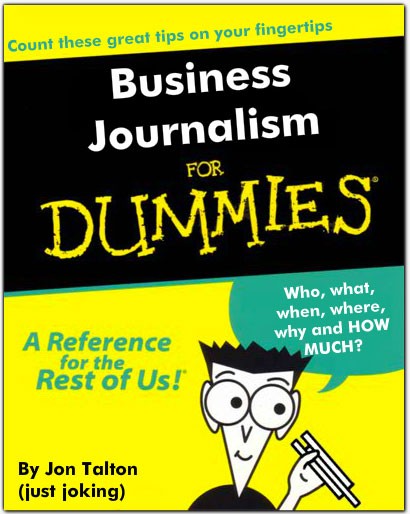No, you’re not a dummy. But if you are starting your first job on the business beat or have been reassigned to business after spending 10 years covering school boards (Zzzzz), you might feel that way, being dumped into this alien world.
Here are a few key concepts.
1. You will be covering two kinds of companies, broadly speaking. Publicly held companies are those that sell stock in the public markets, are registered with the Securities and Exchange Commission and typically have a broad base of shareholders. They have to report information to the public, such as quarterly and annual earnings, as well as unusual events, such as an investor typically buys more than 5 percent of the shares. Thing Microsoft, Boeing and Procter & Gamble. Privately held firms, such as Koch Industries, don’t face this requirement.
2. Take a basic business math course at a community college. Here are a few basics: You will report on revenues and earnings. The two are separate but frequently conflated. Revenues represent all the money that comes in the door. Earnings are what’s left over after expenses (I am simplifying here). Earnings are shown as both a total amount and earnings-per-share. You will, at the least, want to report all these numbers and compare them against the numbers for the same period the previous year.
3. Millions vs. billions. Your stories will contain plenty of numbers. Don’t let these get confused. Similarly, watch percentages. If unemployment went from 6.7 percent to 6.5 percent, it did not fall 2 percent or even 2 percentage points. It fell two-tenths of a percent.
4. A public company (and many private ones) are owned by the shareholders. These investors run from pension funds, mutual funds and private equity to mom-and-pop individuals. Most shares are common shares. Companies also issue preferred shares which offer some benefits (such as ability to act as a creditor, whereas common shareholders are wiped out if the company tanks). Bondholders don’t own the firm. They lend it money by purchasing its bonds. If the company seeks bankruptcy protection, they are first in line to recoup their money.
5. Companies are governed by a chief executive and his or her management lieutenants and a board of directors. In theory, the directors represent the shareholders and are led by a chairman. The CEO works for them. In practice in American companies, the CEO and chairman roles are combined. Yes, this makes for poor corporate governance.
6. Don’t write in business-speak. At best, it is inelegant. At worst, it is meant to conceal and lie (see Dilbert). Thus, something doesn’t “impact” the shares, it affects them. That subdivision will contain 100 houses, not “homes” (the latter being a marketing term and value judgment). It may be a gated property, but not a “gated community” (same reason as the previous sentence). When they talk about providing “solutions,” what does that mean? The odious term “consumer” should be used sparingly; use “customer” when possible.
7. Learn the real businesses that every company is involved in. Don’t be afraid to act dumb. You have the best job in the world: You get to ask questions. What’s the history of each business; how is it performing; who are the main competitors?
“Avoid business-speak:
That subdivision will contain
100 houses, not ‘homes’. It may be
a gated property, but
not a ‘gated community’.”
8. Set up a portfolio of companies you cover on Google Finance, Yahoo Finance, the Wall Street Journal or another site. Sign up for alerts. How the stock is performing can be important news. The alerts can give you an early warning of news coming out of these firms. Seeking Alpha is especially useful because it archives the conference calls where the top executives talk to analysts about quarterly earnings and other events.
9. You will accumulate a variety of sources. Among them are securities analysts who are paid to follow and comment on various companies; academics who study industries; economists; insiders such as top executives or others who work for the company, as well as vendors and competitors. Always seek out the top experts. Always be careful. For example, with an analyst you will want to know if she works for an investment bank and if it holds shares in the company she’s following. This can be a red flag (e.g. Henry Blodget, who landed just fine, thank you). If you do your job well, you will also find deep-background sources among employees and directors.
10. Language can be as dangerous as that seemingly innocuous police brief that leads to a lawsuit. What you write can move a company’s stock and affect its reputation. If a company seeks Chapter 11 bankruptcy court protection, write that. It is not “bankrupt.” Similarly, he careful what you Tweet or post elsewhere on social media. Remember, anybody can sue you and consume huge time and money even if an appeals court finally overturns a judgment.
11. Print out and memorize the code of ethics of the Society of American Business Editors and Writers. Follow it rigidly. For example, you must not own shares in a company you follow. And it’s the little things: I don’t even let a source buy me a cup of coffee. Businesses must be trained that we are not their publicists or cheerleaders. Your integrity is paramount.
12. Try not to let your predecessor get out the door or the cubicle without a full debrief. You want him to tell you as much as possible for a smooth hand-off. Here’s my plan for getting up to speed.
13. And, for a baker’s dozen, read my post about rookie mistakes and how to avoid them.
Congratulations. You have entered the fellowship of business and financial journalists. Done right, it is among the most important jobs in the world, and one of the sexiest. If you think “business news is boring,” you’re not doing it right.










